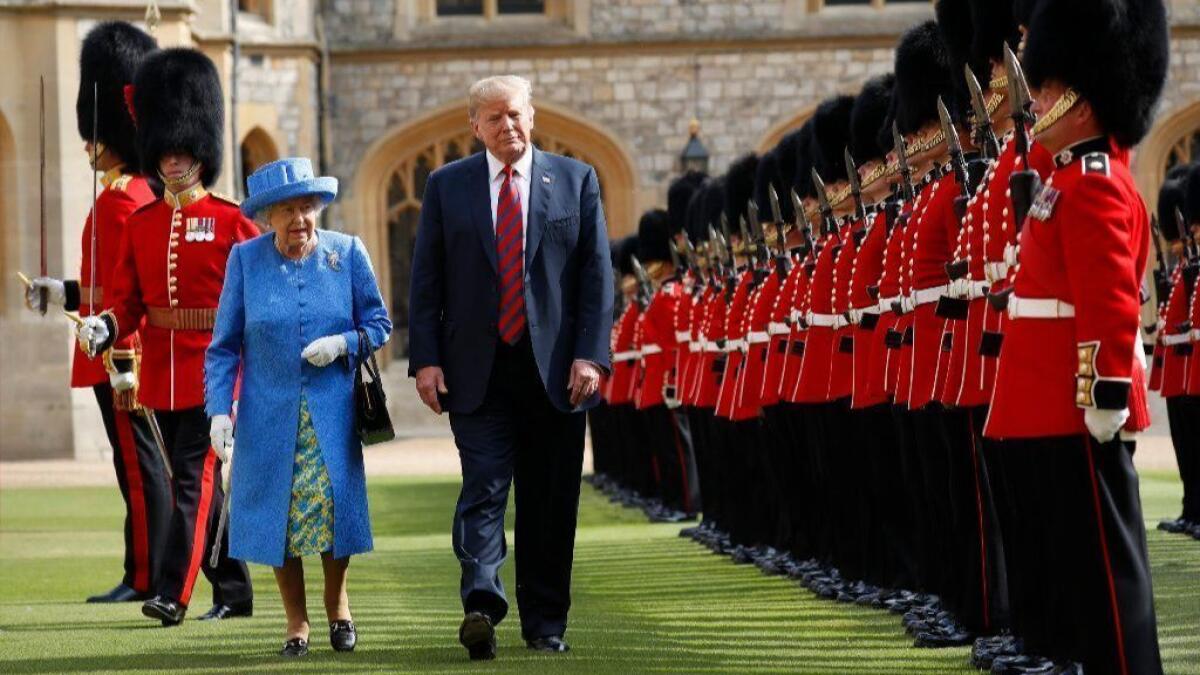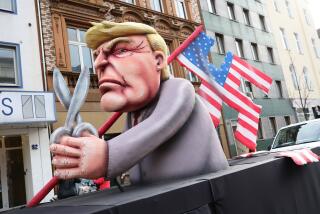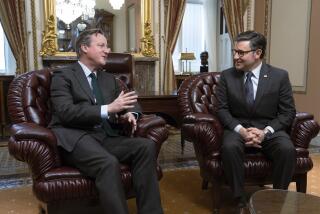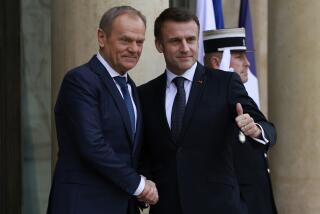Trump heads to London amid Brexit furor and political upheaval in Europe. What could go wrong?

President Trump, a disruptive global force with a penchant for diplomatic gaffes and inserting himself into other countries’ politics, leaves Sunday for the United Kingdom and France at a moment of intense political tumult across Europe.
His state visit to Britain will center around a banquet with Queen Elizabeth II and the steadfastly apolitical royal family at Buckingham Palace, a coveted invitation. The four-day trip also includes a two-hour visit to Normandy, France, to mark the 75th anniversary of the D-day invasion, and two nights at the president’s golf resort on the west coast of Ireland.
For the record:
4:25 p.m. June 2, 2019An earlier version of this report said Marine Le Pen’s nationalist party took 24% of the French vote during recent European Union elections while French President Emmanuel Macron’s party took 21%. The actual results were 23.3% for Le Pen’s party and 22.4% for Macron’s party.
Britain faces deep uncertainty about the imminent departure of Prime Minister Theresa May, questions about who will replace her and how that person can deliver what she could not: the long anticipated and painful separation from the European Union.
Trump will meet with May on Tuesday, four days before she leaves office as a casualty of the Brexit crisis. But he was not invited to speak to Parliament, as President Obama did in 2011, a snub that reflects Britain’s deep unease with Trump’s abrasive politics. Street protests are expected, and London’s City Hall has given permission for a massive orange-haired baby blimp to fly over Parliament Square.
“Ten years ago, most people would have looked at the United Kingdom and the United States of America as the world’s two strongest, most stable democracies,” said R. Nicholas Burns, a former U.S. ambassador to NATO under President George W. Bush. “Ten years later, they’re both in existential crisis — the U.K. because of Brexit and the U.S. because of Trump.”
The visit comes just after European Union parliamentary elections that saw modest gains by far-right populists fashioned in the Trump mold — a reflection of the widespread unrest, stemming from a slow-growing economy and an immigration crisis that has created upheaval across the continent.
As president, he has challenged transatlantic relations with some of America’s most important and reliable allies, threatening new tariffs, demanding that NATO allies contribute more to their own defense and even describing the European Union as “a foe” because of its trade practices.
The president’s visit to the American cemetery overlooking Omaha Beach in Normandy, where some 9,380 U.S. servicemen killed in the June 1944 D-day invasion are buried, is also laden with awkward subtext.
Last November, Trump flew to Paris but showed scant interest in ceremonies marking the centennial of the World War I armistice. He skipped a wreath-laying ceremony at an American cemetery and a march down the Champs-Elysees with other world leaders intended to convey solidarity for the international order — an order that Trump, with his America First mantra and sovereignty-focused foreign policy, seemingly has worked to unwind.
The D-day anniversary “is going to be a day of memorials and reflection, thinking back on what alliances have meant to both Europe and the U.S. for the last 75 years,” said Rachel Rizzo, a fellow at the Center for a New American Security, a bipartisan think tank in Washington. “Memorializing that with Donald Trump, who has put more stress on the transatlantic relationship than any leader in history, is going to be a really interesting optic.”
Last summer, Trump’s visit to the United Kingdom was overshadowed by his sharp criticism of May on the eve of their meeting, when he told a London tabloid that she had disregarded his advice on how to carry out Brexit and that her top political rival, Boris Johnson, would be a solid successor.
Now that May is on the way out, Trump has expressed sympathy for her plight. But he’s left the door open to meeting in London with Johnson or Nigel Farage, two combative pro-Brexit politicians seeking a larger role in the new British government.
Johnson could become the next leader of May’s Conservative Party, while Farage’s recently formed Brexit Party took in 32% of the vote in the May 23-26 EU parliamentary elections.
“They’re friends of mine,” Trump said at the White House last week. “But I haven’t thought about supporting them. Maybe it’s not my business to support people. But I have a lot of respect for both of those men.”
Trump claimed to have predicted the surprising 2016 Brexit vote, which he held up as proof that his own unexpected election was indeed possible. His continued support for Brexit could undermine U.S. efforts to persuade British leaders not to issue licenses to Chinese telecommunications giant Huawei, which is on a U.S. trade blacklist, according to Daniel Fried, a former U.S. diplomat in Europe who now is at the nonpartisan Atlantic Council think tank in Washington.
“Statements in support of Brexit can only hurt the U.S. ability to get things done,” Fried said.
Trump’s decision to host Hungary’s far-right prime minister, Viktor Orban, at the White House on the eve of the EU elections was perceived by some as an endorsement of populist forces that could have affected the eventual vote.
Like many European leaders, French President Emmanuel Macron is also staring down the forces of populist nationalism. His main political rival, Marine Le Pen, gained ground in the EU elections, which saw her nationalist party take 23.3% of the French vote while Macron’s La Republique En Marche party earned 22.4% .
Trump might hold a news conference Tuesday after his meeting with May, and he is set to meet with Macron at a chateau in Caen on Thursday following the D-day ceremonies. He is skipping an evening dinner Macron is hosting for world leaders and returning to his golf club in Ireland.
What he says publicly after meeting the two leaders is, as always with Trump, impossible to predict.
“Does the president want to highlight the difficulties and make it more difficult for these leaders, or does he want to lift them up and try to encourage them in their pursuits?” said Heather Conley, a former senior State Department official who now runs the Europe program at the Center for Strategic and International Studies, another think tank in Washington.
“Hopefully this is an occasion that’s so important that he will resist his temptation to weigh in and perhaps make things worse,” she said. “But we will just have to see.”
If past is prologue, Trump won’t resist the urge to weigh in with his own opinions and to align himself with populist, nationalistic leaders he views as strong.
Trump’s in-your-face put-down of May last summer, just before they met, reflected the president’s indifference to diplomatic norms that world leaders should avoid meddling in another nation’s politics while abroad, as well as his tendency to frequently embarrass his foreign hosts.
In Tokyo last week, Japanese Prime Minister Shinzo Abe rolled out the red carpet for Trump, making him the guest of honor at a sumo match and a historic ceremony for the new emperor, and making sure the president was always within reach of a hamburger.
Trump thanked Abe by going against his own advisors and publicly dismissing the significance of recent North Korean missile tests that could pose an existential threat to Japan.
Days after returning from Japan, Trump involved himself in Israel’s domestic crisis, tweeting support for Prime Minister Benjamin Netanyahu as the leader faced a deadline for forming a coalition government. Netanyahu failed and was forced to call new elections.
While Trump remains popular in Israel, his backing is likely to mean less in Europe — and could backfire.
“The real fear is that he gets himself involved in the Conservative Party leadership contest by expressing his opinions about what should happen and who should win, particularly if he seems to be endorsing a particular candidate,” said Tim Bale, a professor of politics at Queen Mary University of London.
“Donald Trump is seen as a laughingstock and figure of fun, not someone who you would necessarily take seriously, not someone whose judgment is trusted or respected,” Bale added. “So gaining an endorsement from him might work for a maverick or insurgent like Nigel Farage, but I’m not so sure any of the Tory contenders would be desperate to get his seal of approval.”
Even if Trump finds personal validation in the success of fellow populists, there is little to indicate that the rise of Farage or Johnson in British politics would pay dividends for troubled transatlantic relations.
“There was this idea that because the president embraced Brexit during the campaign and is close to Farage, that they would get preferential treatment, that the U.K. could rekindle its ‘special relationship’ with the U.S. But Trump hasn’t shown great interest in this relationship,” said Benjamin Haddad, the director of the Atlantic Council’s Future Europe Initiative.
“It’s just ‘America first’” for Trump, he added. “If Britain is weakened, then it just makes for easy prey.”
More stories from Eli Stokols »
More to Read
Get the L.A. Times Politics newsletter
Deeply reported insights into legislation, politics and policy from Sacramento, Washington and beyond. In your inbox three times per week.
You may occasionally receive promotional content from the Los Angeles Times.







